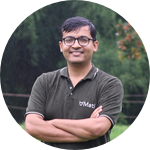About This Project
Mati Carbon PBC uses basalt based enhanced rock weathering to remove carbon from the atmosphere while improving soil health and crop productivity for smallholder farmers in the Global South.
After successfully executing with smallholder farmers in India, we are expanding into Tanzania where >19 million people live in lands affected by land degradation.
This project will enable trials in Southern Tanzania to test the science and efficacy of impact in a new agroecology zone.
Ask the Scientists
Join The DiscussionWhat is the context of this research?
Achieving Net Zero targets require Gt scale durable carbon removal. According to the IPCC, 10+ Gt carbon removal is required per year by 2050. ERW provides a scalable gigaton pathway to carbon removal without requiring land use change while providing significant soil enrichment and farmer income co-benefits.
In Southern Tanzania, rainfall variability has exacerbated the issue of low productivity where more than 2 million farmers can benefit from ERW intervention.
Scientific studies have evaluated the global potential of ERW to be ~2 to 4 gigatons per annum (Beerling et.al 2020). Additionally, ERW provides significant co-benefits that can increase farmer income in Tanzania through enhanced productivity and through reduction in costs by decreasing chemicals usage
What is the significance of this project?
ERW processe releases key nutrients such as calcium, magnesium, potassium, other metal cations and plant available silica which enhance micronutrient availability and soil structure. This in turn results in healthier crops and lower observed need for pesticides and fertilizers.
Mati experience over last 2 years shows that crop yields increase by 20%-30%, resulting in typical farmer’s income by ~$300/year. We expect similar level of benefits to accrue to smallholder farmers in Tanzania.
This project will enable megaton scale carbon removal from Tanzania in the next 5-10 years as new MRV allows for ERW to scale-up in the region and benefit over 2million smallholder farmers in the long-run with >$50 million in annual income increase.
More details and references in additional info section
What are the goals of the project?
We aim to experiment and develop a new ERW MRV in the local agroecology zone in Southern Tanzania. Specifically, we intend to answer:
- What modifications are necessary to ensure our MRV aligns with specific needs of the region?
What are the key rural, social, and cultural dynamics to deploy new agri technology?
What are the unique characteristics of the agroecology zone that require adaptation of ERW field execution
- How can we adapt our solution to ensure its long-term viability and scalability?
We will continuously iterate on the MRV stack to make it fit for purpose. Key indicators - # of Smallholder sign-ups, increase in productivity, enhancement in SHF income will enable us to quantify the impact and modify as needed
Budget
Mati’s plan to conduct ERW trials on identified sites in Southern Tanzania. These trials will assess the viability of ERW and enable the development of an appropriate MRV stack to set us on a scaling path in the region. Efficient and successful ERW deployment involves developing a scientifically robust technology stack and Monitoring, Reporting, and Verification (MRV) solution and measuring the farming productivity impact for each new agroecology zone
Having established a similar MRV in India, Mati has detailed protocols for running experiments for collecting empirical evidence for adapting its MRV protocol. This budget will allow our scientist to travel to the field sites to evaluate conditions, connect with farmers and study soil geochemistry. It will also allow us to apply ERW rock materials to farmer fields for ONE growing season to collect valuable productivity increase data. Lastly soil samples collected will allow us to learn about weathering efficiency.
Endorsed by
 Project Timeline
Project Timeline
We intend to conduct the trial over the next 12 months.
The first 3 months will be spent in setting up farmer relations and establishing feasible rocks and soils compatibility zones.
The next 6 months will be coincide with an actual growing season for the farmers where field application of the materials will be done and samples taken to study the effects.
The last 3 months will consist of running advanced spectrometry lab procedures and running models for MRV.
Dec 31, 2024
Engage and enroll local farmers and establish feasible farming regions for trials by studying rock and soil compatibilities
Jun 30, 2025
Field application of ERW rock dust and running experimental MRV protocol for data collection
Oct 31, 2025
Laboratory results of Samples collected and model simulations for ERW CDR calculations
Meet the Team
Team Bio
Shantanu Agrawal – Founder Mati - Serial Entrepreneur, B. Tech IIT Roorkee, MBA Harvard University
Dr Jake Jordan - CSO - PhD, Geological and Earth Sciences, The University of Texas
Rwitwika Bhattacharya – Climate Justice Lead - Ex-World bank. MPP, Harvard University, Founder: Swaniti Initiative
Bhawesh Malhotra – VP Operations - Lt. Col Indian Armed forces B. Tech Agri.; MBA
Sitali Clifton – Director, Zambia - Secretary and Business Manager, Livingstone
Shantanu Agarwal
Shantanu is an engineer, inventor, and climate tech entrepreneur with more than 20 year of industry experience. He has founded multiple successful startups and non-profits in the energy and climate domain.
Shantanu has experience in building startups, both as an entrepreneur and as an investor. He led the origination in a large energy technology venture capital fund in the past where he has invested and experienced the scaling journey of multiple startups as a board member.
Shantanu is deeply passionate about climate change mitigation and development efforts in vulnerable populations. He has been working towards this goal with his technology startups and non-profit efforts for more than a decade.
In 2021, Shantanu identified the potential of enhanced rock weathering as a tool for climate change mitigation and climate justice for vulnerable farmers. He has since founded “Mati Carbon PBC” to build robust scientific methodology for carbon removal MRV and scaling up operations. Mati has already touched more than 20,000 farmer lives in rural central India and on track to remove >20,000 Tons CO2e from its deployments till date.
Jacob Jordan
Mati’s science and research is led by Dr. Jacob (Jake) Jordan (AB, University of Chicago, PhD University of Texas). Dr. Jordan previously worked as Head of Science for Lithos Carbon, Inc and has consulted for numerous CDR projects and institutions including the Yale Center for Natural Carbon Capture (YCNCC) the Yale Carbon Containment Lab, CREW Carbon among others.
Jake leads Mati’s Science team with a focus on building robust MRV processes and researching the durability of ERW as a carbon dioxide removal strategy. Jake is particularly interested in developing novel methodologies for measuring the extent of weathering, once rock feedstock is applied to managed land. In addition, he is working to develop theoretical frameworks to help enhanced rock weathering suppliers quantify the relevant timescales to consider carbon credit generation.
In 2023 Jake joined Mati Carbon as Chief Science Officer. He is most excited by the prospect that Mati's research and operations are directly and quantifiably benefiting smallholder farmers.
Dr. Jordan is among the recipients of the Google Carbon Removal Research Awards in 2023.
Ankit Srivastava
Ankit Srivastava is responsible for supporting all growth initiatives at Mati Carbon, including fundraising and helping drive product development.
Lab Notes
Nothing posted yet.
Additional Information
Mati Carbon is a durable carbon removal company that focuses on smallholder farmer income increase in the Global South.
Our technology of using enhanced rock weathering in smallholder farmer fields has dual benefit of increased crop productivity and durable scalable carbon removal.
We have existing operations in India, Zambia where we have over 8000 partner farmers already engaged with us. We will deliver $1 million+ to smallholder farmers in increased income in 2024.
Overview:
- US Delaware registered Public Benefit Corp, controlled by a US 501(c)(3) organization; founded by serial entrepreneur Shantanu Agarwal (Schmidt Climate Innovation Fellow, Mulago Henry Fellow)
- Enables climate resilience of smallholder farmers in the Global South through Enhanced Weathering (EW; i.e. soil amendments) that leads to durable 10,000+ year permanence carbon removal, improved crop productivity, and reduced use of chemical fertilizers.
- Feb 2024 PNAS paper: CDR = 10.5 ± 3.8 t CO2 ha−1 over four years; maize and soybean yields increased by 12 to 16% attributed to improved soil fertility and decreased soil acidification.
- Initial deployments in India (rice paddies) -- already developing new sites in SE Asia, Sub-Saharan Africa.
- Frontier Climate supplier at strong offtake price; path to full offtake at scale.
- Robust MRV developed in collaboration with Yale University; completed diligence with Carbonfuture, Ceezer, Puro Earth.
- By June 2024, Mati's cumulative deployments will constitute the largest permanent engineered CDR in the global south by any company in the world.
- Next decade target: 1 M tpa CO2 removal within the next decade.
Additional References:
Mati Carbon Removals Fights Climate Change, Enables Climate Resilience for Marginal Farmers in India
Potential of basalt dust to improve soil fertility and crop nutrition
Rock dust as a source of nutrients for upland rice crop
Yield, nutrient uptake and potassium use efficiency in rice fertilized with crushed rock
Project Backers
- 0Backers
- 100%Funded
- $50,000Total Donations
- $0Average Donation



